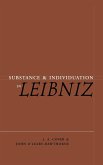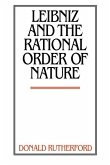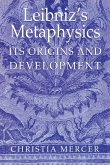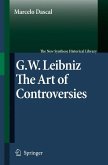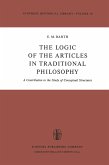- Broschiertes Buch
- Merkliste
- Auf die Merkliste
- Bewerten Bewerten
- Teilen
- Produkt teilen
- Produkterinnerung
- Produkterinnerung
In a detailed but accessible introduction, Patrick Riley outlines the fundamental themes in Leibniz's work, particularly his concepts of justice and social responsibility, and assesses the important differences between Leibniz and his English contemporaries Hobbes and Locke.
Andere Kunden interessierten sich auch für
![Leibniz and China Leibniz and China]() Franklin PerkinsLeibniz and China48,99 €
Franklin PerkinsLeibniz and China48,99 €![Substance and Individuation in Leibniz Substance and Individuation in Leibniz]() J. A. CoverSubstance and Individuation in Leibniz110,99 €
J. A. CoverSubstance and Individuation in Leibniz110,99 €![Leibniz and the Rational Order of Nature Leibniz and the Rational Order of Nature]() Donald RutherfordLeibniz and the Rational Order of Nature55,99 €
Donald RutherfordLeibniz and the Rational Order of Nature55,99 €![Leibniz's Metaphysics Leibniz's Metaphysics]() Christia MercerLeibniz's Metaphysics51,99 €
Christia MercerLeibniz's Metaphysics51,99 €![Gottfried Wilhelm Leibniz Gottfried Wilhelm Leibniz]() Marcelo DascalGottfried Wilhelm Leibniz167,99 €
Marcelo DascalGottfried Wilhelm Leibniz167,99 €![Leibniz's Metaphysics of Time and Space Leibniz's Metaphysics of Time and Space]() Michael FutchLeibniz's Metaphysics of Time and Space115,99 €
Michael FutchLeibniz's Metaphysics of Time and Space115,99 €![The Logic of the Articles in Traditional Philosophy The Logic of the Articles in Traditional Philosophy]() E. M. BarthThe Logic of the Articles in Traditional Philosophy39,99 €
E. M. BarthThe Logic of the Articles in Traditional Philosophy39,99 €-
-
-
In a detailed but accessible introduction, Patrick Riley outlines the fundamental themes in Leibniz's work, particularly his concepts of justice and social responsibility, and assesses the important differences between Leibniz and his English contemporaries Hobbes and Locke.
Produktdetails
- Produktdetails
- Verlag: Cambridge University Press
- Revised
- Seitenzahl: 262
- Erscheinungstermin: 2. Juli 2010
- Englisch
- Abmessung: 216mm x 140mm x 16mm
- Gewicht: 374g
- ISBN-13: 9780521358996
- ISBN-10: 052135899X
- Artikelnr.: 21632943
- Herstellerkennzeichnung
- Libri GmbH
- Europaallee 1
- 36244 Bad Hersfeld
- gpsr@libri.de
- Verlag: Cambridge University Press
- Revised
- Seitenzahl: 262
- Erscheinungstermin: 2. Juli 2010
- Englisch
- Abmessung: 216mm x 140mm x 16mm
- Gewicht: 374g
- ISBN-13: 9780521358996
- ISBN-10: 052135899X
- Artikelnr.: 21632943
- Herstellerkennzeichnung
- Libri GmbH
- Europaallee 1
- 36244 Bad Hersfeld
- gpsr@libri.de
Prefae to the second edition; Abbreviations; Introduction; Part I. On
Justice and Natural Law: 1. Meditation on the common concept of justice (c.
1702-3); 2. Opinion on the principles of Pufendorf (1706); Part II. On
Social Life, Enlightenment and the Rule of Princes: 3. On natural law; 4.
Notes on social life; 5. Felicity (c. 1694-8?); 6. Portrait of the prince
(1679); 7. Memoir for enlightened persons of good intention (mid-1690s);
Part IIII. On State-Sovereignty and Hobbesian Ideas: 8. Caesarinus
Fürstenerius (De Suprematu Principium Germaniae) (1677); Part IV. On the
Defense of Hapsburg Europe against France: 9. Mars Christianissumus (most
Christian war-god) (1683); 10. Manifesto for the defense of the Rights of
Charles III (1703); Part V. On International Relations and International
Law: 11. Codex Iuris Gentium (Prefatio) (1693); 12. On the works of the
Abbé de St Pierre (1715), observations on the Abbé's Project for Perpetual
Peace (1715), Letter II to Grimarest (1712); Part VI. Political Letters:
13. Excerpts from letters to Landgraf Ernst of Hesse-Rheinfels , Bousset
and Thomas Burnett, two letters to Landgraf Ernst of Hesse-Rheinfels
(1683-91), two letters to Bousset concerning the reunification of
Christendom (1692-9), three letters to Thomas Burnett (1699-1712); 14.
Judgement of the works of the Earl of Shaftesbury (1712); Part VII.
Sovereignty and Dignity: Unpublished Manuscripts, 1695-1714: 15. An
unpublished manuscript of Leibniz on the allegiance due to sovereign powers
(1695); 16. Leibniz' unpublished remarks on Abbé Bucquoi: divinity and
sovereignty (1711); 17. An unpublished lecture by Leibniz on the Greeks as
founders of rational theology: its relation to his 'Universal
Jurisprudence' (1714); Critical Bibliography; Index.
Justice and Natural Law: 1. Meditation on the common concept of justice (c.
1702-3); 2. Opinion on the principles of Pufendorf (1706); Part II. On
Social Life, Enlightenment and the Rule of Princes: 3. On natural law; 4.
Notes on social life; 5. Felicity (c. 1694-8?); 6. Portrait of the prince
(1679); 7. Memoir for enlightened persons of good intention (mid-1690s);
Part IIII. On State-Sovereignty and Hobbesian Ideas: 8. Caesarinus
Fürstenerius (De Suprematu Principium Germaniae) (1677); Part IV. On the
Defense of Hapsburg Europe against France: 9. Mars Christianissumus (most
Christian war-god) (1683); 10. Manifesto for the defense of the Rights of
Charles III (1703); Part V. On International Relations and International
Law: 11. Codex Iuris Gentium (Prefatio) (1693); 12. On the works of the
Abbé de St Pierre (1715), observations on the Abbé's Project for Perpetual
Peace (1715), Letter II to Grimarest (1712); Part VI. Political Letters:
13. Excerpts from letters to Landgraf Ernst of Hesse-Rheinfels , Bousset
and Thomas Burnett, two letters to Landgraf Ernst of Hesse-Rheinfels
(1683-91), two letters to Bousset concerning the reunification of
Christendom (1692-9), three letters to Thomas Burnett (1699-1712); 14.
Judgement of the works of the Earl of Shaftesbury (1712); Part VII.
Sovereignty and Dignity: Unpublished Manuscripts, 1695-1714: 15. An
unpublished manuscript of Leibniz on the allegiance due to sovereign powers
(1695); 16. Leibniz' unpublished remarks on Abbé Bucquoi: divinity and
sovereignty (1711); 17. An unpublished lecture by Leibniz on the Greeks as
founders of rational theology: its relation to his 'Universal
Jurisprudence' (1714); Critical Bibliography; Index.
Prefae to the second edition; Abbreviations; Introduction; Part I. On
Justice and Natural Law: 1. Meditation on the common concept of justice (c.
1702-3); 2. Opinion on the principles of Pufendorf (1706); Part II. On
Social Life, Enlightenment and the Rule of Princes: 3. On natural law; 4.
Notes on social life; 5. Felicity (c. 1694-8?); 6. Portrait of the prince
(1679); 7. Memoir for enlightened persons of good intention (mid-1690s);
Part IIII. On State-Sovereignty and Hobbesian Ideas: 8. Caesarinus
Fürstenerius (De Suprematu Principium Germaniae) (1677); Part IV. On the
Defense of Hapsburg Europe against France: 9. Mars Christianissumus (most
Christian war-god) (1683); 10. Manifesto for the defense of the Rights of
Charles III (1703); Part V. On International Relations and International
Law: 11. Codex Iuris Gentium (Prefatio) (1693); 12. On the works of the
Abbé de St Pierre (1715), observations on the Abbé's Project for Perpetual
Peace (1715), Letter II to Grimarest (1712); Part VI. Political Letters:
13. Excerpts from letters to Landgraf Ernst of Hesse-Rheinfels , Bousset
and Thomas Burnett, two letters to Landgraf Ernst of Hesse-Rheinfels
(1683-91), two letters to Bousset concerning the reunification of
Christendom (1692-9), three letters to Thomas Burnett (1699-1712); 14.
Judgement of the works of the Earl of Shaftesbury (1712); Part VII.
Sovereignty and Dignity: Unpublished Manuscripts, 1695-1714: 15. An
unpublished manuscript of Leibniz on the allegiance due to sovereign powers
(1695); 16. Leibniz' unpublished remarks on Abbé Bucquoi: divinity and
sovereignty (1711); 17. An unpublished lecture by Leibniz on the Greeks as
founders of rational theology: its relation to his 'Universal
Jurisprudence' (1714); Critical Bibliography; Index.
Justice and Natural Law: 1. Meditation on the common concept of justice (c.
1702-3); 2. Opinion on the principles of Pufendorf (1706); Part II. On
Social Life, Enlightenment and the Rule of Princes: 3. On natural law; 4.
Notes on social life; 5. Felicity (c. 1694-8?); 6. Portrait of the prince
(1679); 7. Memoir for enlightened persons of good intention (mid-1690s);
Part IIII. On State-Sovereignty and Hobbesian Ideas: 8. Caesarinus
Fürstenerius (De Suprematu Principium Germaniae) (1677); Part IV. On the
Defense of Hapsburg Europe against France: 9. Mars Christianissumus (most
Christian war-god) (1683); 10. Manifesto for the defense of the Rights of
Charles III (1703); Part V. On International Relations and International
Law: 11. Codex Iuris Gentium (Prefatio) (1693); 12. On the works of the
Abbé de St Pierre (1715), observations on the Abbé's Project for Perpetual
Peace (1715), Letter II to Grimarest (1712); Part VI. Political Letters:
13. Excerpts from letters to Landgraf Ernst of Hesse-Rheinfels , Bousset
and Thomas Burnett, two letters to Landgraf Ernst of Hesse-Rheinfels
(1683-91), two letters to Bousset concerning the reunification of
Christendom (1692-9), three letters to Thomas Burnett (1699-1712); 14.
Judgement of the works of the Earl of Shaftesbury (1712); Part VII.
Sovereignty and Dignity: Unpublished Manuscripts, 1695-1714: 15. An
unpublished manuscript of Leibniz on the allegiance due to sovereign powers
(1695); 16. Leibniz' unpublished remarks on Abbé Bucquoi: divinity and
sovereignty (1711); 17. An unpublished lecture by Leibniz on the Greeks as
founders of rational theology: its relation to his 'Universal
Jurisprudence' (1714); Critical Bibliography; Index.




